Home Tags Posts tagged with "Spain"
Spain
The European Commission has warned Italy and Spain that their draft budgets for 2014 may not comply with new eurozone debt and deficit rules.
The European Union’s executive arm also said French and Dutch plans only just passed muster.
Non-complying countries may have to revise their tax and spending plans before re-submitting them to national parliaments.
It is the first time the Commission has done this.
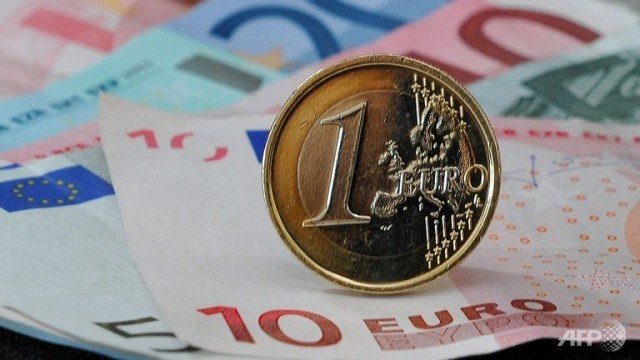
The European Commission has warned Italy and Spain that their draft budgets for 2014 may not comply with new eurozone debt and deficit rules
Under EU rules, eurozone member states are obliged to cut deficits until they achieve a balanced budget or go into surplus.
They also have to reduce public debt levels.
The European Commission does give countries some flexibility if their deficit is below the EU ceiling of 3% of gross domestic product (GDP) and their debt levels are falling.
But when Italy, the eurozone’s third largest economy, asked for such leniency over its 2014 budget plans, the Commission refused because its public debt is still rising.
France, which has slipped back into recession, has taken steps to cut its deficit to below the 3% threshold, but its structural reform plans were only making “limited progress”, the Commission said.
Other countries at risk of breaking EU rules included Finland, Luxembourg and Malta.
Spain has demanded the US to give details of any eavesdropping, amid reports it monitored 60 million Spanish telephone calls in a month.
The US ambassador to Spain, who had been summoned by its EU minister, vowed to clear the “doubts” that had arisen about his country’s alleged espionage.
Spanish Minister for European Affairs Inigo Mendez de Vigo said such practices, if true, were “inappropriate and unacceptable”.
An EU delegate in Washington said there had been “a breakdown of trust”.
Representatives from the European Parliament’s Committee on Civil Liberties, Justice and Home Affairs spoke to members of the US Congress about the alleged US spying on European leaders and citizens.
German Chancellor Angela Merkel is also sending intelligence officials to Washington to demand answers to claims that her phones were tapped for a decade.

Spain has demanded the US to give details of any eavesdropping, amid reports it monitored 60 million Spanish telephone calls in a month
German media reported that the US had bugged Angela Merkel’s phone for more than a decade – and that the surveillance only ended a few months ago.
The German government hoped that trust between the two countries could be restored, a spokesman told a news conference in Berlin.
The latest allegation, published by Spain’s El Mundo newspaper, is that the NSA tracked tens of millions of phone calls, texts and emails of Spanish citizens, in December 2012 and January 2013. The monitoring allegedly peaked on December 11.
The White House has so far declined to comment on the El Mundo report.
It is not clear how the alleged surveillance was carried out, whether it was through monitoring fibre-optic cables, data obtained from telecommunication companies, or other means.
The NSA is reported to have collected the sender and recipient addresses of emails, along with their IP addresses, the message file size, and sometimes the top or subject line of the message.
For each telephone call, the numbers of the caller and recipient are believed to have been logged, as was its duration, time, date and location.
The contents of the telephone call itself, however, were not monitored, US intelligence officials say. The NSA has also suggested it does not usually store the geolocational information of mobile phone calls, which could determined by noting which mobile signal towers were used.
[youtube K58q7sunxtM 650]
According to Spanish media, the NSA secretly monitored 60 million phone calls in Spain in one month.
The reports say the latest allegations came from documents provided by forer NSA analyst Edward Snowden.
They say the NSA collected the numbers and locations of the caller and the recipient, but not the calls’ content.
This comes as a EU parliamentary delegation prepares for a series of meetings in Washington.
The officials from the European parliament’s Civil Liberties Committee will speak to members of Congress to convey concerns and gather information.
Meanwhile a Japanese news agency says that the NSA asked the Japan’s government in 2011 to help it monitor fibre-optic cables carrying personal data through Japan, to the Asia-Pacific region.
The reports, carried by the Kyodo news agency, say that this was intended to allow the US to spy on China – but Japan refused, citing legal restrictions and a shortage of personnel.

The NSA secretly monitored 60 million phone calls in Spain in one month
The White House has so far declined to comment on Monday’s claims about US spying in Spain, published in the newspapers El Pais and El Mundo.
It is alleged that the NSA tracked millions of phone calls, texts and emails from Spanish citizens between December 10 2012 and January 8, 2013.
The US ambassador to Madrid has been summoned to meet a Spanish foreign ministry official later on Monday to discuss earlier allegations about US spying on Spanish citizens and politicians.
It follows German media reports that the US was bugging Chancellor Angela Merkel’s phone for more than a decade – and that the surveillance only ended a few months ago.
Angela Merkel is sending her country’s top intelligence chiefs to Washington this week to “push forward” an investigation into the spying allegations, which have caused outrage in Germany.
Britain’s Guardian newspaper reported on Friday that the NSA had monitored the phones of 35 world leaders. Again Edward Snowden was the source of the report.
[youtube fIqRb9-xIh8 650]
Spain is to consider changing time zones by an hour after a report said this would improve eating, sleeping and working habits.
The document by a parliamentary commission said that “Spain for more than 71 years has not been in the correct time zone”.
In 1942, the Spanish dictator General Franco moved Spain onto Central European Time to follow Nazi Germany.
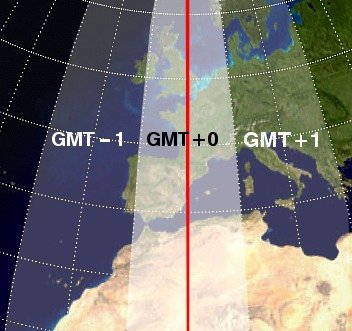
Spain is to consider changing time zones by an hour after a report said this would improve eating, sleeping and working habits
The report says Spain should be in the same time zone as the UK and Portugal.
Spain – on the western edge of Europe – is currently one hour ahead of GMT during the winter and two hours ahead in the summer.
“We sleep almost an hour less than the World Health Organization recommends,” the commission said.
“All this has a negative effect on productivity, absenteeism, stress, accidents and school drop-out rates.”
It said that following the “wrong clock” explained why Spaniards tended to eat, leave work and go to bed later than their European neighbors.
“Our timetable is determined more by the sun than by the clock. We eat at one o’clock in the afternoon and dine at eight, according to the sun, but the clock says it is three o’clock and 10 o’clock,” the text said.
It added that jumping back an hour would bring Spain “into line with Europe in many respects in which we currently differ”.
The European Commission is suing Spain over the refusal of some of its hospitals to recognize the European Health Insurance Card (EHIC).
The EHIC entitles EU citizens to free healthcare in public hospitals.
But some Spanish hospitals rejected the card and told tourists to reclaim the cost of treatment via their travel insurance, the European Commission says.
It is not accusing cash-strapped Spanish hospitals of trying to make money.

The European Commission is suing Spain over the refusal of some of its hospitals to recognize the European Health Insurance Card
The Commission, which checks compliance with EU law, has requested information on the issue from the Spanish government – the first stage of an infringement procedure which could eventually result in a fine.
Under the health card system, an EU citizen’s home health service is supposed to cover the cost of emergency treatment abroad.
The EHIC is mainly intended for emergency treatment abroad, but also covers patients for pre-existing medical conditions. In cases where doctors think a European visitor’s treatment can wait until they get home then the EHIC can be deemed invalid.
The EHIC is intended to give foreign visitors the same level of care in emergency cases as locals get.
The Commission says it has had hundreds of such complaints concerning Spain. It says the much higher cost of private treatment is being passed on to the travel insurance companies “or, increasingly, is being billed to the citizens directly”.
[youtube 2sBADmoDp10]
Two North African suspects thought to be linked to al-Qaeda in the Islamic Maghreb (AQIM) have been arrested in Spain, according to police.
An Algerian identified as Nou Mediouni was arrested in Zaragoza, northern Spain, the interior ministry said.
The other suspect, a Moroccan named Hassan El Jaaouani, was arrested in Murcia in the south.
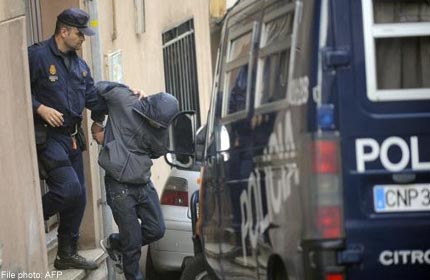
Two North African suspects thought to be linked to al-Qaeda in the Islamic Maghreb have been arrested in Spain
They have “a similar profile to the two suspects who carried out the Boston attacks”, the ministry said. French police had helped to track them down.
AQIM is among several Islamist groups fighting French and West African troops in Mali.
It has its roots in the bitter Algerian civil war of the early 1990s, but in 2007 it emerged as an international jihadist group linked to Osama Bin Laden’s network. AQIM says its aim is to spread Islamic law and it is known for kidnapping Westerners and extracting ransoms.
It is not clear whether the men arrested in Spain are suspected of planning any attacks. Their similarity to the Boston marathon bombers was not explained in the ministry statement.
Moroccan Islamists linked to al-Qaeda were found guilty of the 2004 Madrid train bombings which killed nearly 200 people and injured more than 1,800.
[youtube a0QOop0RE0A]
Spain’s troubled Bankia – formed of the merger of seven floundering savings banks – has reported a record loss of 19.2 billion euros ($25.2 billion) for 2012.
Bankia, which received aid of 18 billion euros, made a loss of 19.2 billion euros for 2012 and put aside provisions of 26.8 billion euros.
Last year, Bankia and its parent firm, BFA, asked for EU funds to help rebuild its capital.
Spain’s bank rescue fund said Bankia itself had a negative value, although its parent had some worth.
Bankia was born out of the merger of seven savings banks that were highly exposed to Spain’s property sector, which crashed five years ago.
The Bankia-BFA group as a whole made losses after tax of 21.2 billion euros in 2012.
Bankia’s seven component banks were severely damaged by their loans to property developers and home buyers during the country’s property bubble that ended in the late 2000s.
The bank’s shares were suspended at the start of the year.

Spain’s troubled Bankia has reported a record loss of 19.2 billion euros for 2012
About 1.5 million people have taken part in Catalonia’s annual independence rally in Barcelona, police say.
Tens of thousands of people poured into the city waving the region’s independence flag and brandishing the colors red and yellow.
This year’s march, which aimed to be the biggest ever, was also a protest against the Spanish government’s tax laws.
Catalonia wants Madrid to review its tax agreement and provide a bailout.
The size of the turnout for the rally, which is held annually on 11 September to mark the Siege of Barcelona 300 years ago, forced organizers to change its route.

About 1.5 million people have taken part in Catalonia's annual independence rally in Barcelona
The Catalan government believes it is owed money by the central government because it says it pays a disproportionate level of taxes to Madrid in relation to the funding it receives.
The far north-east region, which has claimed independence from Spain for centuries, has demanded a bailout from Madrid of 5 billion euros.
Economists have warned that the Catalan government has barely enough money to pay its public sector workers.
As a nation, Spain’s struggling economy has declined for three consecutive quarters as it continues to suffer from the effects of its property bust caused by the financial crisis.
Catalonia is Spain’s wealthiest region and represents a fifth of the Spanish economy.
It has to take out 13 billion euros in loans this year to refinance maturing debt, on top of funding its deficit for the current year.
Other regions have appealed to the government for bailouts. The latest, Andalusia, asked for an immediate injection of 1 billion euros last week.
Valencia and Murcia have also requested bailouts in recent weeks.
[youtube 5E6K2admC_Q]
Fears that other Spanish regions may follow Valencia in seeking a bailout from Madrid have rattled markets.
A local newspaper in Murcia, one of Spain’s smallest regions, quoted the regional government’s head as saying it would ask for funding help of up to 300 million Euros.
On Friday Valencia asked the central government for a financial lifeline.
The yield on Spain’s 10-year bond jumped to 7.4%, while the euro fell to an 11-year low against the yen.
On Friday the bond yield – which implies the interest rate the government would have to pay to borrow new money, and acts as a measure of investor confidence in Spain’s creditworthiness – was at 7.28%.

Fears that other Spanish regions may follow Valencia in seeking a bailout from Madrid have rattled markets
Many of Spain’s regions have high borrowing needs, and speculation is growing that a number of them will follow Valencia and ask formally money from Madrid at a time when the central government itself is having trouble borrowing money.
In Asian trading overnight, the euro fell to an 11-year low against the Japanese yen – which has acted as a safe haven currency since the 2008 financial crisis – amid fears that debt problems in Spain are worsening.
The euro fell to 94.37 yen, its lowest level since November 2000.
Analysts said the developments in Spain had raised fears that the eurozone debt crisis was worsening and spreading to the region’s biggest economies.
Asian stock markets also fell on Monday amid fears that the ongoing debt problems in eurozone will hurt the region’s growth.
Japan’s Nikkei 225 index fell 1.9%, South Korea’s Kospi dropped 1.8% and Australia’s ASX 200 index shed 1.7%.
The eurozone is a key market for Asian exports and there are concerns that demand from the region may decline in the near term.
At the same time, a weaker euro has also added to the woes of Asian exporters, as it makes their goods more expensive for buyers from the region.
Police in Spain have fired rubber bullets to clear demonstrators in Madrid as a day of nationwide protests against spending cuts ended in unrest.
Protesters set alight rubbish bins as riot police charged them in the city centre, near the parliament building.
Seven people were arrested and at least six injured, officials said.
Earlier, tens of thousands of people held largely peaceful protests across Spain against the latest government austerity measures.
Public sector workers crowded the streets of Madrid, Barcelona and several other cities, chanting slogans against government “robbery”.
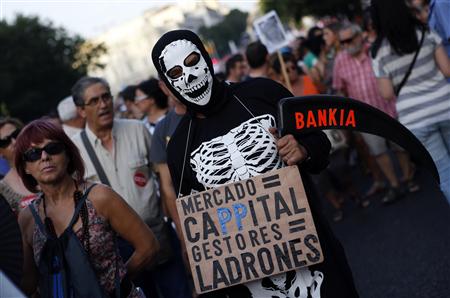
Tens of thousands of people held largely peaceful protests across Spain against the latest government austerity measures (Photo: Reuters)
Among those protesting were firefighters and police officers, as well as health and education workers.
“We have lived through bad times, but this takes the biscuit,” fireman Francisco Vaquero, 58, told the Reuters news agency.
The new 65 billion-euro ($80 billion) package of public sector wage cuts and tax rises were announced last week by Prime Minister Mariano Rajoy.
He said it was part of a deal with eurozone leaders to help rescue Spain’s troubled banks. Parliament ratified the measures on Thursday.
Earlier in the day, Germany’s parliament voted in favor of the 100 billion-euro bailout for Spain’s debt-laden banking sector.
Government austerity measures aimed at cutting Spain’s large deficit have prompted frequent protests, including one by miners against subsidy cuts last week.
At a debt auction on Thursday, Spain managed to raise 2.98 billion euros on the financial markets, but at the cost of sharply higher interest rates compared to an auction last month.
Debt-laden Spain has raised 2.98 billion Euros on the financial markets, but was forced to pay higher interest rates.
The average yield on bonds repayable in five years rose to 6.46%, against 6.07% at an auction last month.
The average yield on seven-year bonds was 6.7%, up from 4.83% last time.
“They [Spain] sold what they wanted to sell, that’s about the only good thing about it,” said Monument Securities analyst Marc Oswald.

Debt-laden Spain has raised 2.98 billion Euros on the financial markets
Investor demand for the bonds fell, with the issue 2.1 times oversubscribed, compared with 3.4 times in June.
Investors remain worried about Spain’s high funding costs and whether there is a viable plan to recover from a four-year economic downturn.
Later on Thursday, German MPs were due to vote on an aid package of up to 100 billion Euros for Spain.
It is expected that the government of Chancellor Angela Merkel may suffer a small rebellion, but that MPs will still clear the rescue package.
Angela Merkel said ahead of the vote: “From what I am hearing, I am optimistic.”
The German parliament has been recalled from its summer break to vote on the emergency eurozone action.
Italian and Spanish 10-year bond yields have been rising ahead of a summit of eurozone finance ministers on Monday.
The yield on Spanish 10-year bonds, which are taken as a strong indicator of the interest rate the government would have to pay to borrow money, rose above 7%, while Italian bond yields rose to 6.1%.
Yields above 7% are considered to be unsustainable in the long term.
Details of the bailout of Spain’s banks are expected from eurozone ministers.
Their meeting will continue on Tuesday.
The high yields on Spanish and Italian bonds were in contrast to the rates at a short-term German bond auction on Monday.

Italian and Spanish 10-year bond yields have been rising ahead of a summit of eurozone finance ministers on Monday
The yield on six-month German bonds fell to a record low of -0.03%, meaning that investors were paying the German government to lend money to them.
It is the second time that German bond yields have been negative. The auction was oversubscribed, despite the negative yield.
Investors have been flocking to German debt as a safe haven from the problems elsewhere in the eurozone.
Eurozone officials have been reported as warning that not too many quick decisions should be expected from the finance ministers’ meeting, which is supposed to add detail to the agreements from the eurozone leaders’ summit on 29 June.
The communiqué from that summit said it expected the finance ministers “to implement these decisions by 9 July”, although many analysts say that now looks optimistic.
Leaders have already agreed to lend Spain’s banks up to 100 billion Euros ($123 billion) and independent audits have said that they will need up to 62 billion Euros.
The finance ministers are likely to confirm the size of the bailout and which conditions will be applied to the loans, both for the banks and the government.
Among the key agreements from the 29 June summit were moves towards banking union with the European Central Bank (ECB) acting as a supervisor and allowing European bailout funds to buy bonds to try to reduce countries’ borrowing costs.
But since the summit, there have been signs that Finland and the Netherlands would oppose the use of bailout funds in this way.
There is expected to be discussion of the new Greek government’s policies. At the end of a three-day debate, the Greek government, as expected, won a vote of confidence on Sunday.
Another area of discussion for the eurozone finance ministers will be choosing a new leader.
Jean-Claude Juncker has been co-ordinating the Eurogroup of finance ministers since 2005. His term of office ends on 17 July, but it may be extended.
Also on Monday, ECB president Mario Draghi will be appearing before the European Parliament’s Committee on Economic and Monetary Affairs to give his views on the state of the currency bloc’s economy.
The New York Times: Rising Borrowing Costs Put Pressure on European Finance Ministers
Spain wins Euro 2012 final after beating Italy with 4-0 and claiming a successive European crown to add to their 2010 World Cup triumph.
Vicente del Bosque’s side staged a compelling claim to be the greatest international side of all time as the Euro 2012 final was transformed into an exhibition with Italy – who performed creditably for long periods – passed brutally into submission.
David Silva’s header was reward for Spain’s early supremacy and new Barcelona recruit Jordi Alba doubled the lead just before half-time with a blistering run and finish.
The scoreline was emphatic at the conclusion but Italy performed with great resolve. Once they were reduced to 10 men after losing third substitute Thiago Motta to injury, however, they were ruthlessly exposed by masters of the passing art.
Fernando Torres emerged as a late substitute to make a powerful impact; steering home Spain’s third then setting up Chelsea team-mate Juan Mata to inflict the final wound on a bedraggled Italy.
Spain’s virtuoso performance was a decisive answer to a growing band of critics who had forced coach Vicente Del Bosque and his players to defend themselves against allegations that they had been “boring” throughout Euro 2012 at the pre-match media conference.

Spain wins Euro 2012 final after beating Italy with 4-0 and claiming a successive European crown to add to their 2010 World Cup triumph
And even Arsenal manager Arsene Wenger, in a spectacularly ill-timed contribution, wrote that Spain “have betrayed their philosophy and turned it into something more negative”.
Every quality that has led to them dominating world football since they won Euro 2008 and the World Cup in South Africa two years later was brought to bear.
It was a heartbreaking night for Italy and coach Cesare Prandelli but there was no shame in being beaten by a team of such quality. They can reflect with satisfaction on their work before this chastening evening.
Spain, perhaps stung by the words of criticism aimed in their direction, started with a pace and tempo of passing that the Italians found impossible to live with.
The warning signs were posted for Italy when a long spell of possession ended with Xavi shooting just over – but it was not long before they were ahead.
Cesc Fabregas was employed in the so-called “False Nine” role as Del Bosque played without a conventional striker. The former Arsenal star proved the tactic is a positive force rather than a negative one.
He collected the masterly Andres Iniesta’s pass and outflanked Italy defender Giorgio Chiellini before delivering perfectly for Silva to head beyond keeper Gianluigi Buffon.
It was Chiellini’s final contribution as he swiftly succumbed to the thigh injury that has been troubling him in the later stages of the tournament and was replaced by Federico Balzaretti.
Italy’s response to Silva’s goal and the early Spanish onslaught was commendable as Antonio Cassano twice had shots saved by keeper Iker Casillas but a goal of brilliance in creation and execution made their task mountainous.
Alba demonstrated exactly why Barcelona were so keen to bring the graduate of their famous La Masia youth academy back to the Nou Camp from Valencia when he finished a blurring run on to Xavi’s perfect pass with a composed finish past Buffon.
Prandelli acted during the interval, sending on Antonio Di Natale for Cassano. Twice he almost got the goal that could have halted Spain, heading just over before bringing a fine save out of Casillas.
Italy’s third and final change came when Motta replaced Riccardo Montolivo but Italy’s luck was summed up when he suffered a hamstring injury within minutes and the Azzurri were reduced to 10 men.
Spain were now winning with something to spare and Del Bosque took the opportunity to remove the outstanding Fabregas and introduce Chelsea striker Torres for the closing stages.
It was an opportunity he took, adding the final flourishes by steering home Spain’s third and unselfishly setting up Mata’s finish to round off a spectacular performance.
Spain’s economy minister Luis de Guindos has dampened speculation that the country is about to seek a bailout of its bank sector.
Luis de Guindos said no decision would be made until audits of the banks were completed, possibly by the end of June.
There have been reports in the past few days that Spain was seeking an immediate bailout from eurozone funds.
Luis de Guindos was speaking in Brussels, where plans have been published that aim to ensure that taxpayers do not have to fund future bailouts of banks.
An IMF audit of Spain’s banks is due next week, with further independent reports completed about two weeks after, Luis de Guindos said.
“I have absolutely not discussed any intervention in Spain’s banks today,” he told reporters on the sidelines of meetings in Brussels.
Asked if Spain was preparing a request for EU aid, Luis de Guindos said: “We are not preparing anything… we have a road map.”
With investors demanding higher returns to lend money to Spain, its finance minister said the credit markets were “effectively shut” to Spain, inflaming worries that the country would be forced to join Greece, Portugal and Ireland and seek outside help.
Spain has to find at least 80 billion Euros ($100 billion) to strengthen its banks’ capital buffers.
A key test will come on Thursday, with Spain due to auction up to 2 billion Euros of bonds.
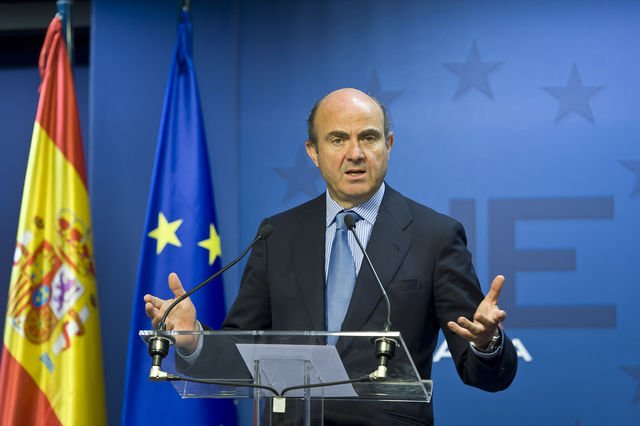
Spain's economy minister Luis de Guindos has dampened speculation that the country is about to seek a bailout of its bank sector
Spain is keen to avoid having to ask for a European Union bailout as this would come with strict conditions.
It is instead seeking funds which could be injected directly into the banking system.
Reports suggesting EU officials are looking at how this could happen contributed to a rally on European markets late in the afternoon.
UK Prime Minister David Cameron and US President Barack Obama kept up pressure on European leaders, calling for an “immediate plan” to restore confidence, after the two men spoken on the telephone last night.
David Cameron is due to meet German Chancellor Angela Merkel on Thursday to discuss the issues.
The European Central Bank (ECB) appeared unlikely to take any immediate action to provide further financial support, despite president Mario Draghi acknowledging the seriousness of the eurozone’s crisis.
After the ECB left interest rates unchanged at 1% on Wednesday, Mario Draghi suggested that further monetary policy was not the answer.
The ECB has provided 1 trillion Euros for the banking system with two re-financing operations, or LTROs, designed to ease borrowing costs.
Despite signs that borrowing costs are once again rising sharply, Mario Draghi said: “The issue now is whether these LTROs would actually be effective. Some of these problems in the euro area have nothing to do with monetary policy… and I don’t think it would be right for monetary policy to fill other institutions’ lack of action.”
On Wednesday, the European Commission unveiled proposals designed to stop taxpayers’ money being used to bail out failed banks.
The aim is to ensure losses are borne by bank shareholders and creditors and minimize costs for taxpayers.
However, new legislation is unlikely to come into force before 2014 at the earliest, too late to protect taxpayers from any further immediate bank failures.
“The proposal we have today may be only useful for the future but it does not solve the current problems we face,” said Sharon Bowles, chair of the European Parliament’s economic and finance committee.
There would be new requirements for countries to prepare for a bank collapse, collecting money through an annual levy on banks that would be used to provide emergency loans or guarantees.
The European Commission plans involve drawing up a EU-wide framework that would allow:
• Financial regulators to be more “intrusive” in the running of banks as firms’ stability worsens
• Forcing banks to draw up explicit “recovery” and “resolution” plans in the event of their finances deteriorating
• Countries to enforce the sale of all or a part of failed banks, overriding the rights of shareholders or creditors
• Appointment of a “special manager” at a bank to “restore its financial situation”
• Laying the foundations for an “increasingly integrated EU-level oversight of cross-border entities”
The changes form part of commitments agreed by the leaders of the G20 group of major economies in September 2009.
Michel Barnier, the commissioner who unveiled the plans, said: “We must equip public authorities so that they can deal adequately with future bank crises. Otherwise citizens will once again be left to pay the bill, while the rescued banks continue as before knowing that they will be bailed out again.”
If it wins the backing of EU countries and the European Parliament, the law would mark a step in the direction of the banking union supported by European Central Bank president Mario Draghi.
Tens of thousands of people have protested in capital Madrid and in a number of Spanish cities to mark the first anniversary of the “Indignants” movement.
In central Madrid, many protesters occupying Puerta del Sol square ignored a midnight deadline to disperse.
However, by 05:00 a.m. on Sunday police had mainly evicted them.
Indignants movement was formed out of anger at the impact of Spain’s deepest economic crisis in decades. Unemployment hit a record high in April.
The centre-right government has recently announced fresh austerity measures.
The turnout in Madrid was huge and would certainly have met organizers’ expectations.
Spanish authorities had said they wanted the protesters to disperse by midnight local time but many ignored the time limit.
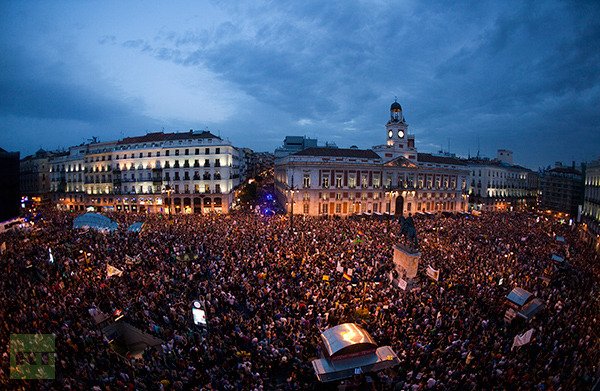
Tens of thousands of people have protested in capital Madrid and in a number of Spanish cities to mark the first anniversary of the "Indignants" movement
Police vans eventually moved in and appeared to have cleared protesters from the square. The atmosphere in other parts of the city centre was reported to be tense on Sunday morning but there were no reports of violence.
“Today’s goal is to recover the public spaces,” protester Sofia Ruiz earlier told Reuters.
“It is also a way to celebrate that we have been existing for one year and that we are going to be there until the system changes or we are listened to and they take into account our claims,” she added.
Last year the Indignants established a protest camp in Puerta del Sol, but the authorities had vowed they would prevent any protesters from staying overnight in the square.
There were some 2,000 riot police on duty.
At least 45,000 people also took to the streets in Barcelona, police said, although organizers put the attendance in the hundreds of thousands.
One protester there, Jose Helmandez, said he was a genetics and molecular biology doctor but had been unable to find a job in his field.
“A lot of people are leaving the country to find work, even if they end up not doing something they are qualified to do,” he said.
“I was living in France but returned to Spain almost two years ago, and all I can find are short-term jobs.”
Some have criticized the movement for having little impact on Spanish politics over the past year.
The government of conservative Prime Minister Mariano Rajoy, elected last November, has introduced budget cuts and tax rises.
Mariano Rajoy has also announced deregulation of the labor market, angering Spanish unions.
“This is a long-distance race, no-one can change an entire political system in one day or one year, it takes time,” Noelia Moreno, a former spokeswoman for the Indignants movement in Madrid, told AFP news agency.
Similar protests took place in other cities in Spain and across the world as part of a global day of action, some of them staged by the Occupy movement:
• In London, hundreds of protesters gathered outside St Paul’s Cathedral, where a protest camp was removed in February. A number of people were arrested
• Smaller protests, numbering in the hundreds, have taken place in the Portuguese capital Lisbon and in Germany’s financial centre, Frankfurt
• Around 1,000 marchers converged in Tel Aviv to protest about the cost of living, with marches also reported in other Israeli cities
Meanwhile, in the latest attack on symbols of Italy’s austerity policies, a tax office has been firebombed in the city of Livorno. No-one was hurt.
[youtube tykQjGtW4Hk]
 Prev12Page 2 of 2
Prev12Page 2 of 2















